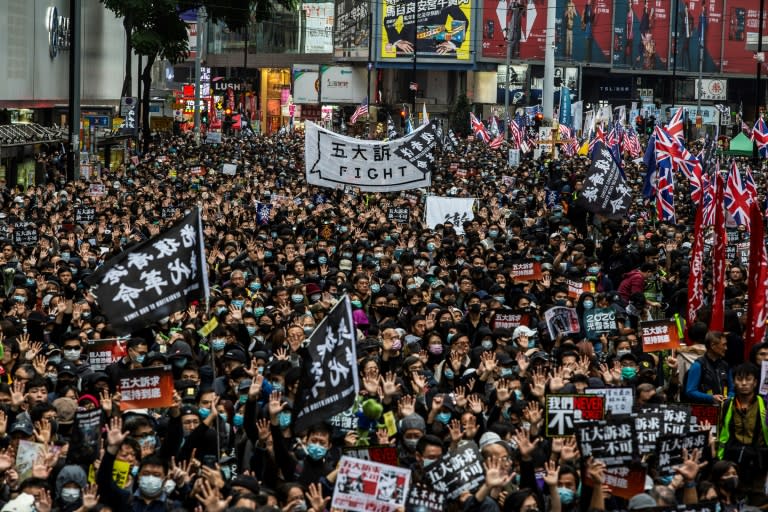sbaker@businessinsider.com (Sinéad Baker), Business Insider•January 13, 2020

China GREG BAKER/AFP via Getty Images
China's crackdown against its Uighur population reportedly involves it ordering people in the Muslim minority to redecorate their homes to make them more Chinese.
Radio Free Asia reported that Uighurs had been ordered to remove traditional furniture or design elements — and witnesses said that the vast majority are complying under threat of being sent to internment camps.
The US estimates that China has up to three million Uighur people detained in these camps, where people who have left speak of torture and medical experiments.
China denies the allegations and calls the camps "re-education" camps.
Uighurs are under heavy surveillance and China sends Chinese men to live with Uighur women, many of whose husbands have been sent to camps, and reports also say that China harvests the organs of Uighurs.
China is reportedly forcing members of its Uighur Muslim minority to redecorate their homes to make them look more traditionally Chinese.
Radio Free Asia reported that officials in China's Xinjiang western region are ordering Uighurs get rid of their their traditional home decoration and to "modernize" the spaces to make them more Chinese-influenced.
This includes replacing rugs and pillows traditionally used to sleep on with beds and the introduction of other furniture like desks, Radio Free Asia reported — with the threat of being placed in an internment camp if they do not comply.
The US State Department estimated last year that China could have up to three million Uighur people detained in these camps and in prisons across Xinjiang.
China calls them "re-education" camps, while those who have left speak of torture and medical experiments in the places. China denies such actions.
As well as these camps, China has taken steps to remove features of Uighur culture.

China's crackdown against its Uighur population reportedly involves it ordering people in the Muslim minority to redecorate their homes to make them more Chinese.
Radio Free Asia reported that Uighurs had been ordered to remove traditional furniture or design elements — and witnesses said that the vast majority are complying under threat of being sent to internment camps.
The US estimates that China has up to three million Uighur people detained in these camps, where people who have left speak of torture and medical experiments.
China denies the allegations and calls the camps "re-education" camps.
Uighurs are under heavy surveillance and China sends Chinese men to live with Uighur women, many of whose husbands have been sent to camps, and reports also say that China harvests the organs of Uighurs.
China is reportedly forcing members of its Uighur Muslim minority to redecorate their homes to make them look more traditionally Chinese.
Radio Free Asia reported that officials in China's Xinjiang western region are ordering Uighurs get rid of their their traditional home decoration and to "modernize" the spaces to make them more Chinese-influenced.
This includes replacing rugs and pillows traditionally used to sleep on with beds and the introduction of other furniture like desks, Radio Free Asia reported — with the threat of being placed in an internment camp if they do not comply.
The US State Department estimated last year that China could have up to three million Uighur people detained in these camps and in prisons across Xinjiang.
China calls them "re-education" camps, while those who have left speak of torture and medical experiments in the places. China denies such actions.
As well as these camps, China has taken steps to remove features of Uighur culture.

uighur china prison camps protest xinjiang Achmad Ibrahim/AP
China also runs a "Pair Up and Become Family" program, where it sends Chinese men to live with Uighur women, many of whose husbands have been sent to these camps.
Radio Free Asia previously reported that the men often sleep in the same bed as the women, and discuss the ideology of China's Communist Party during their stay.
One US-based Uighur activist, whose family are detained, called it "mass rape."
"The government is offering money, housing, and jobs to Han people to come and marry Uighur people," the unnamed activist said.
According to Radio Free Asia, China has created a $575 million fund to "modernize" the Uighur people, which includes destroying traditional design features in their homes.
Radio Free Asia spoke to one person in the region who said that Uighur people are complying with the order, and that around 80% or 90% of people in one village have complied.

China also runs a "Pair Up and Become Family" program, where it sends Chinese men to live with Uighur women, many of whose husbands have been sent to these camps.
Radio Free Asia previously reported that the men often sleep in the same bed as the women, and discuss the ideology of China's Communist Party during their stay.
One US-based Uighur activist, whose family are detained, called it "mass rape."
"The government is offering money, housing, and jobs to Han people to come and marry Uighur people," the unnamed activist said.
According to Radio Free Asia, China has created a $575 million fund to "modernize" the Uighur people, which includes destroying traditional design features in their homes.
Radio Free Asia spoke to one person in the region who said that Uighur people are complying with the order, and that around 80% or 90% of people in one village have complied.

FILE PHOTO: A propaganda banner and a security camera are placed on the walls of a mosque in the Old City in Kashgar, Xinjiang Uighur Autonomous Region, China September 6, 2018. Picture taken September 6, 2018. REUTERS/Thomas PeterMore
It also spoke to one resident whose husband is at a Chinese camp who said that she had changed her home such that "you can't even recognize it anymore" and that she had "gotten rid of pretty much all of the carpets" under the order.
"We don't even wait for the officials to tell us what to do anymore because we all are so enlightened now," she said.
China sees Uighurs' religion as a threat, and began its movement against the people in 2016.
Reports have detailed a coordinated government effort detain them, and to subject them to extremely high levels of surveillance, including installing spyware on their phones and forbidding them from communicating with people outside of the Xinjiang region.
China has also been accused of harvesting organs from persecuted groups including Uighurs, though it denies this.
It also spoke to one resident whose husband is at a Chinese camp who said that she had changed her home such that "you can't even recognize it anymore" and that she had "gotten rid of pretty much all of the carpets" under the order.
"We don't even wait for the officials to tell us what to do anymore because we all are so enlightened now," she said.
China sees Uighurs' religion as a threat, and began its movement against the people in 2016.
Reports have detailed a coordinated government effort detain them, and to subject them to extremely high levels of surveillance, including installing spyware on their phones and forbidding them from communicating with people outside of the Xinjiang region.
China has also been accused of harvesting organs from persecuted groups including Uighurs, though it denies this.
---30---
China defends barring Human Rights Watch head from Hong Kong
Jing Xuan TENG, AFP•January 13, 2020

Kenneth Roth was supposed to give a press
conference in Hong Kong to unveil the
New York-based rights group's latest global survey
(AFP Photo/JOHN MACDOUGALL)

Beijing (AFP) - China on Monday defended barring the head of Human Rights Watch from entering Hong Kong, saying non-governmental organisations were responsible for political unrest in the city and should "pay the proper price".
Kenneth Roth was supposed to give a press conference in Hong Kong this week to unveil the New York-based rights group's latest global survey, which accuses China of prosecuting "an intensive attack" on international human rights agencies.
The long-time executive director said Sunday that he was turned back by authorities at the city's airport.
China last month announced sanctions on American NGOs, including HRW, in retaliation for the passage of a US bill backing Hong Kong's pro-democracy movement.
"Allowing or not allowing someone's entry is China's sovereign right," foreign ministry spokesman Geng Shuang said at a regular press briefing.
"Plenty of facts and evidence show that the relevant NGO has through various means supported anti-China radicals, encouraged them to engage in extremist, violent and criminal activity, and incited Hong Kong independence separatist activities," Geng said.
"They bear major responsibility for the current chaos in Hong Kong. These organisations should be punished, and should pay the proper price."
Hong Kong has been battered by nearly seven months of occasionally violent protests, its biggest political crisis in decades.
Millions have turned out on the streets of the semi-autonomous financial hub to demand greater democratic freedoms.
"Why does Beijing advance the ludicrous fiction that @HRW incited the Hong Kong pro-democracy protests?" Roth fired back on Twitter.
"Because it is desperate to pretend that hundreds of thousands of Chinese citizens aren't protesting Beijing's increasingly dictatorial rule."
- Not the first -
Roth joins a growing list of openly critical academics, researchers, politicians and activists who have been refused entry in recent years.
Financial Times journalist Victor Mallet was denied a visa renewal without reason in 2018 after he hosted a talk with the leader of a small and now banned independence party at the city's press club.
Last September, an American academic was barred from entering after he testified in a Congressional hearing alongside prominent Hong Kong democracy activists.
"I had hoped to spotlight Beijing's deepening assault on international efforts to uphold human rights," Roth said. "The refusal to let me enter Hong Kong vividly illustrates the problem."
Phil Robertson, deputy director of Human Rights Watch's Asia division, said that when Roth asked why he was prevented from entering Hong Kong, he was only told that it was "immigration reasons".
"What we believe is that he was stopped because the Chinese government is afraid to have the world know what they are doing to the people of Hong Kong and the people of China," Robertson told AFP in Bangkok.
The unrest that began last June is the biggest crisis the former British colony has faced since its return to Chinese rule in 1997.
Under the terms of the handover, Hong Kong enjoys unique freedoms unseen on the mainland, but in recent years fears have increased that these liberties are being chipped away as Beijing exerts more control over the territory.
China and the Hong Kong administration have refused to cede to the protesters' demands, which include fully free elections in the city, an inquiry into alleged police misconduct, and amnesty for the nearly 6,500 people arrested during the movement -- nearly a third of them under the age of 20.
Hong Kong's Foreign Correspondents' Club, which was to host Roth's press conference on Wednesday, said in a statement it was concerned that the city's government was using the immigration department to "act punitively against organisations and media representatives it does not agree with, which is a violation of the commitment to free expression and free speech in Hong Kong law."
---30---
No comments:
Post a Comment